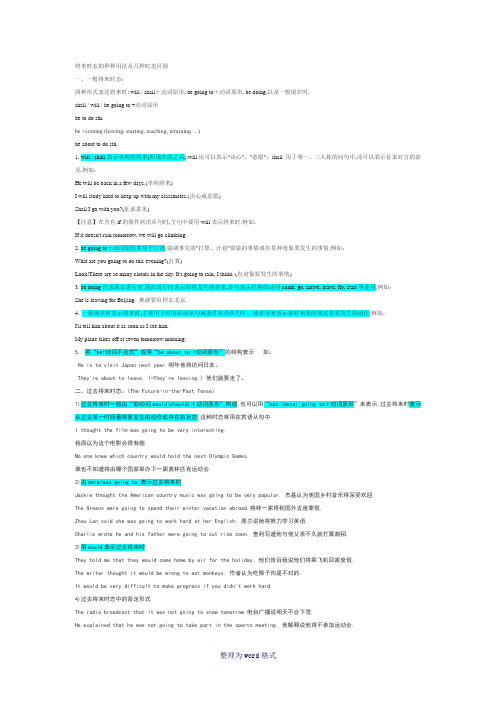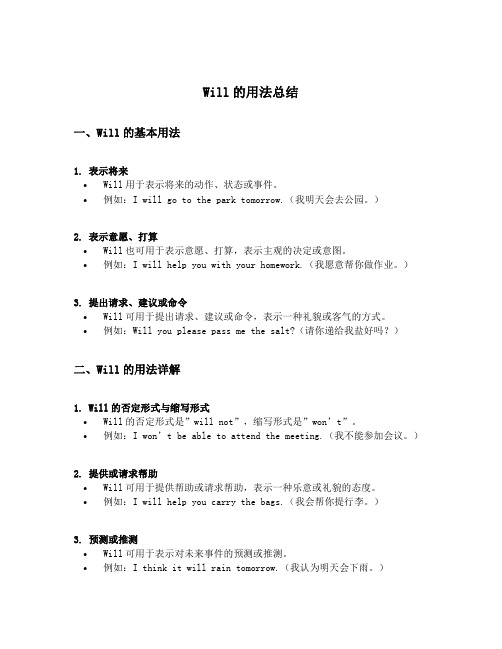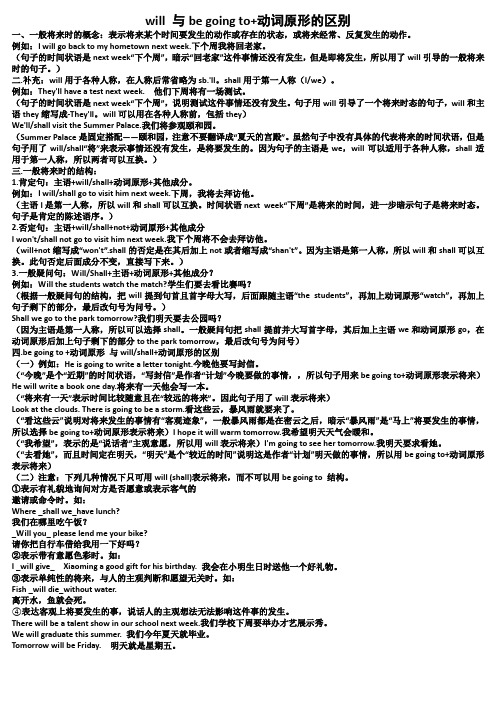will,shall,be going to的用法详解
中考英语:一般将来时(shall/will/be going to区别)

中考英语:一般将来时(shall/will/be going to区别)什么是一般将来时?一般将来时表示在将来某一时间将要发生的动作或存在的状态。
主语+ WILL+ 动词原形主语+ SHALL+ 动词原形主语+ AM/IS/ARE GOING TO + 动词原形SHALL的用法SHALL + 动词原形(主语一般都是第一人称)当主语是第一人称的时候,我们通常用SHALL来提问,多用于征求意见和建议。
SHALL I GO SHOPPING WITH YOU?SHALL WE GO SHOPPING?I SHALL HAVELUNCH.WILL 句型WILL + 动词原形肯定句:主语+ WILL + 动词原形否定句:主语+ WILL + NOT + 动词原形一般疑问句:WILL+主语+动词原形…?特殊疑问句:特殊疑问词+ WILL + 主语+ 动词原形…?BE GOING TO的句型BE GOING TO + 动词原形肯定句:主语+ BE GOING TO + 动词原形否定句:主语+ BE GOING TO + NOT + 动词原形一般疑问句:BE + 主语+ GOING TO+ 动词原形…?特殊疑问句:特殊疑问词+ BE + 主语+ GOING TO + 动词原形…?BE GOING TO & WILL的区别BE GOING TO一般指主观已经计划好的事情,强调某个意图是经过事先考虑好的,是近期计划,通常可以看到时间标志词。
表示客观迹象马上要发生的事情,有迹象预测。
WILL 指主语本身愿意做的事情,没有经过事先考虑,而是在说话的当时临时想到的,临时决定。
主观猜测或希望等内心活动,想得到肯定的回答、表示将会发生的事情。
1.—WHERE IS THE DIRTY CLOTHES?—I _WILL_ GET IT FOR YOU. (NOT PLANNING)2.—WHAT ARE YOU GOING TO DO THIS WEEKEND?—I AM GOING TO_ VISIT MY GRANDMA THIS WEEKEND. (PLANNED IT BEFORE)3. I HOPE SHE _WILL_ COME TO MY WEDDING.4. I THINK SHE _WILL_ LIKE MY PRESENT FOR HER.5. LOOK AT THE SKY,IT_IS GOING TO RAIN.一般将来时还有哪些标志词?•HE IS GOING TO TAKE A PHOTO TOMORROW.•HE IS GOING TO MAKE A CAKE NEXT WEEK.•HE IS GOING TO OPEN A CAN IN TWO DAYS.•HE THINKSHEWILL LOSE WEIGHT ONE DAY.TOMORROW类:TOMORROW, THE DAY AFTER TOMORROW 等NEXT +时间:NEXT WEEK, NEXT MONTH, NEXT YEAR 等IN + 时间段:IN TWO DAYS, IN A WEEK 等其他:IN THE FUTURE , ONE DAY, SOMEDAY,SOON 等一般将来时肯定句型•主语+ WILL/SHALL + 动词原形•主语+ AM/IS/ARE GOING TO + 动词原形一般将来时否定句型•主语+ WILL/SHALL + NOT + 动词原形•主语+ AM/IS/ARE + NOT + GOING TO + 动词原形一般将来时一般疑问句型•WILL/SHALL + 主语+ 动词原形…?•AM/IS/ARE + 主语+ GOING TO + 动词原形…?一般将来时特殊疑问句型•疑问词+ WILL/SHALL/BE GOING TO + 主语+ 动词原形…?。
将来时态的种种用法及几种时态区别

将来时态的种种用法及几种时态区别一、一般将来时态:四种形式表达将来时: will / shall+动词原形, be going to+动词原形, be doing,以及一般现在时.shall / will / be going to +动词原形be to do sth.be +coming (leaving, starting, reaching, returning….)be about to do sth.1. will / shall表示单纯的将来(即现在的之后),will还可以表示"决心"、"意愿";shall 用于第一、三人称的问句中,还可以表示征求对方的意见.例如:He will be back in a few days.(单纯将来)I will study hard to keep up with my classmates.(决心或意愿)Shall I go with you?(征求意见)【注意】在含有if的条件状语从句时,主句中要用will表示将来时.例如:If it doesn't rain tomorrow, we will go climbing.2. be going to+动词原形多用于口语,强调事先的"打算、计划"要做的事情或有某种迹象要发生的事情.例如:What are you going to do this evening?(打算)Look!There are so many clouds in the sky. It's going to rain, I think. (有迹象要发生的事情)3. be doing代表现在进行时.现在进行时表示即将发生的将来,多与表示位移的动词come, go, arrive, leave, fly, start等连用.例如:She is leaving for Beijing. 她就要启程去北京.4. 一般现在时表示将来时,主要用于时间状语从句或条件状语从句中;或者用来表示按时刻表的规定将要发生的动作.例如:I'll tell him about it as soon as I see him.My plane takes off at seven tomorrow morning.5.用“be+动词不定式”或用“be about to +动词原形”的结构表示如:He is to visit Japan next year.明年他将访问日本。
一般将来时特殊用法集合

一般将来时的一些特殊用法以下是一些一般将来时态的特殊用法:一、will/shall一般将来时的特殊用法will和shall表示一般将来时的特殊用法主要有以下几种:1. 表示意愿或决心:will可用于表示个人的意愿或决心,表示将来的行动或状态。
例如:“I will do my best to help you.”(我会尽最大努力帮助你。
)2. 表示祝福:在表示祝福或祈祷的语境中,will可用于表示对未来的美好愿望。
例如:“God will bless you.”(愿上帝保佑你。
)3. 表示请求或命令:在书面语或正式场合中,shall可用于表示请求或命令,表示将来的行动或要求。
例如:“You shall not pass.”(你不许过去。
)4. 表示不可避免的情况:shall可用于表示将来不可避免的情况或结果,强调客观事实或命运的决定。
例如:“What will be, will be.”(该发生的事总会发生。
)5. 表示条件:在条件状语从句中,will可用于表示将来的结果或条件。
例如:“If you will help me, I will thank you.”(如果你愿意帮助我,我会感谢你。
)需要注意的是,在使用will和shall时,应根据语境和上下文选择合适的用法。
此外,在现代英语中,will是更为常用的表达一般将来时的助动词,而shall 的用法相对较少,多用于表示法律、条约、合同等正式文件中的规定和条款。
二,表示一般将来时的特殊构成方式还有:1. be going to:表示按照计划或安排将要发生的事情,也可以表示根据目前的迹象或情况预测将会发生的事情。
例如:“It is going to rain this afternoon.”2. be about to:表示某件事情即将发生,时间非常紧迫,几乎就在眼前。
例如:“I am about to leave for work.”3. be+动词不定式:表示计划或安排将来要做的事情。
will,shall,be going to的用法详解

shall用法1.shall 用在第一、三人称作主语的疑问句中,来征求意见,表示“要不要……”Shall I go now? 要我现在就走吗?Shall we invite her, too? 我们也邀请她吗?Shall the house be insured against fire?要给房子保火险吗?Shall the reporters wait outside or what?要记者们在外面等还是怎样?2、shall用在第一、三人称作主语的疑问句中,来征求意见,表示“要不要……”You shall have an answer by tomorrow.到了明天,你就会得到答复的。
If he’s good, he shall have a new watch for Christmas.如果他表现好,在圣诞节就会得到一块新表。
You shall suffer for this.你会这事吃苦头/付出代价!Will 用法1. will可以用在任何人称表示将来要发生的事情,而且所指向的要发生的事情属于“客观”,即不以人的意志为转移。
He will arrive in Nanjing this Friday.My father will be 51 next year.2.will 可以表示“愿意,肯,会”。
I will pay for it.我会付给你钱买下它的。
Go where you will.到你愿意去的地方。
We’re going to have a climbing trip. Come if you will.我们要去爬山。
你愿意的话就跟我们一起来。
3.will 可以表示“倾向、习惯(总是会,老是等意思),在否定句可以表示”不肯,不能“等意思。
Boys will be boys. 男孩子总归是男孩子。
Sometimes the cat will lie there all morning. 有时候猫会整个下午躺在那里。
英语动词的将来时

英语动词的将来时摘要英语动词的将来时是用来表示将来某一时刻或某一段时间内发生的动作或状态,或者表示对将来的打算、预测、安排等。
英语动词的将来时有多种表达方式,主要有以下六种:will/shall + 动词原形be going to + 动词原形be + to + 动词原形be about to + 动词原形be + 现在分词一般现在时这六种表达方式有不同的含义和用法,需要根据语境和语气来选择合适的一种。
本文将分别介绍这六种表达方式的定义、结构、用法和例句,并用表格来对比它们的异同。
1. will/shall + 动词原形1.1 定义will/shall + 动词原形是一种最常用的表示将来时的方式,它可以表示即将发生的动作或状态,或者表示对将来的打算、意愿、决定、预测等。
1.2 结构will/shall + 动词原形的结构如下:人称肯定句否定句一般疑问句特殊疑问句第一人称单数I shall/will do I shall not/will not do Shall/Will I do?What shall/will I do?第二人称单数You will do You will not do Will you do?What will you do?第三人称单数He/She/It will do He/She/It will not do Will he/she/it do?What will he/she/it do?第一人称复数We shall/will do We shall not/will not do Shall/Will we do?What shall/will we do?第二人称复数You will do You will not do Will you do?What will you do?第三人称复数They will do They will not do Will they do?What will they do?1.3 用法will/shall + 动词原形的用法如下:表示即将发生的动作或状态,常与表示将来时间的状语连用,如 tomorrow, next week, in the future 等。
will的用法总结

Will的用法总结一、Will的基本用法1. 表示将来•Will用于表示将来的动作、状态或事件。
•例如:I will go to the park tomorrow.(我明天会去公园。
)2. 表示意愿、打算•Will也可用于表示意愿、打算,表示主观的决定或意图。
•例如:I will help you with your homework.(我愿意帮你做作业。
)3. 提出请求、建议或命令•Will可用于提出请求、建议或命令,表示一种礼貌或客气的方式。
•例如:Will you please pass me the salt?(请你递给我盐好吗?)二、Will的用法详解1. Will的否定形式与缩写形式•Will的否定形式是”will not”,缩写形式是”won’t”。
•例如:I won’t be able to attend the meeting.(我不能参加会议。
)2. 提供或请求帮助•Will可用于提供帮助或请求帮助,表示一种乐意或礼貌的态度。
•例如:I will help you carry the bags.(我会帮你提行李。
)3. 预测或推测•Will可用于表示对未来事件的预测或推测。
•例如:I think it will rain tomorrow.(我认为明天会下雨。
)三、Will与其他表示将来的词汇的比较1. Will与be going to的区别•Will表示主观的意愿或决定,而be going to表示计划、打算或意图。
•例如:I will study for the exam.(我准备好好复习考试。
)•例如:I am going to visit my grandparents.(我打算去拜访我的祖父母。
)2. Will与shall的区别•Will与shall在表示将来时的用法上没有实质性的区别。
Shall在现代英语中已经不常用。
•例如:I will call you later.(我稍后会给你打电话。
will 与be going to的区别

will 与be going to+动词原形的区别一、一般将来时的概念:表示将来某个时间要发生的动作或存在的状态,或将来经常、反复发生的动作。
例如:I will go back to my hometown next week.下个周我将回老家。
(句子的时间状语是next week“下个周”,暗示“回老家”这件事情还没有发生,但是即将发生,所以用了will引导的一般将来时的句子。
)二.补充:will用于各种人称,在人称后常省略为sb.'ll。
shall用于第一人称(I/we)。
例如:They'll have a test next week. 他们下周将有一场测试。
(句子的时间状语是next week“下个周”,说明测试这件事情还没有发生。
句子用will引导了一个将来时态的句子,will和主语they缩写成-They'll。
will可以用在各种人称前,包括they)We'll/shall visit the Summer Palace.我们将参观颐和园。
(Summer Palace是固定搭配——颐和园,注意不要翻译成“夏天的宫殿”。
虽然句子中没有具体的代表将来的时间状语,但是句子用了will/shall“将”来表示事情还没有发生,是将要发生的。
因为句子的主语是we,will可以适用于各种人称,shall适用于第一人称,所以两者可以互换。
)三.一般将来时的结构:1.肯定句:主语+will/shall+动词原形+其他成分。
例如:I will/shall go to visit him next week.下周,我将去拜访他。
(主语I是第一人称,所以will和shall可以互换。
时间状语next week“下周”是将来的时间,进一步暗示句子是将来时态。
句子是肯定的陈述语序。
)2.否定句:主语+will/shall+not+动词原形+其他成分I won't/shall not go to visit him next week.我下个周将不会去拜访他。
一般将来时造句10句

一般将来时造句10句一般将来时表示将来某一时刻的动作或状态,或将来某一段时间内经常的动作或状态,常常和表示将来的时间状语连用。
那么你知道一般将来时要怎么造句子吗?下面店铺为大家整理了10句一般将来时的英语句子,欢迎大家参考学习!一、常见结构1、will / shall + 动词原形(否定句在will/shall后加not)这种方法一般单纯地表示将来某个时间将要发生的动作或存在的状态。
will用于各种人称;shall只用于第一人称。
例如 :I will / shall go to visit him next week. 下周我将去拜访他。
What time shall we go there tomorrow? 明天我们几点去那儿?2、be going to+动词原形be going to 相当于一个助动词(其中be有人称和数的变化),与它后面的动词原形一起构成谓语。
用来表示将要发生的动作以及计划、安排和打算要做的事。
例如:There is going to be a football match this afternoon.今天下午将有一场足球赛。
I‘m going to go to the park. 我将要去公园。
二、常用结构1、用于"I expect, I'm sure, I think, I wonder等的宾语从句"中。
Don't worry about the exam. I'm sure you'll pass.不要担心这次考试,我确信你会通过的。
2、用于祈使句和陈述句中。
Work hard and you will succeed.如果你努力,就会成功的。
3、与表示时间或条件的状语从句连用。
I'll let you know as soon as he arrives.他一到我就通知你。
1 Professor Wang will give us a presentation later.2 Who will come here tomorrow?3 I will visit you next month.4 What will happen in the following week?5 I will go to BeiJing tomorrow.6 What will you do tomorrow?7 Tom will come to my home at 3PM.8 England will play against France tomorrow.9 I will come back to school in September.10 Where will you play basketball next time?。
- 1、下载文档前请自行甄别文档内容的完整性,平台不提供额外的编辑、内容补充、找答案等附加服务。
- 2、"仅部分预览"的文档,不可在线预览部分如存在完整性等问题,可反馈申请退款(可完整预览的文档不适用该条件!)。
- 3、如文档侵犯您的权益,请联系客服反馈,我们会尽快为您处理(人工客服工作时间:9:00-18:30)。
shall用法1.shall 用在第一、三人称作主语的疑问句中,来征求意见,表示“要不要……”Shall I go now? 要我现在就走吗?Shall we invite her, too? 我们也邀请她吗?Shall the house be insured against fire?要给房子保火险吗?Shall the reporters wait outside or what?要记者们在外面等还是怎样?2、shall用在第一、三人称作主语的疑问句中,来征求意见,表示“要不要……”You shall have an answer by tomorrow.到了明天,你就会得到答复的。
If he’s good, he shall have a new watch for Christmas.如果他表现好,在圣诞节就会得到一块新表。
You shall suffer for this.你会这事吃苦头/付出代价!Will 用法1. will可以用在任何人称表示将来要发生的事情,而且所指向的要发生的事情属于“客观”,即不以人的意志为转移。
He will arrive in Nanjing this Friday.My father will be 51 next year.2.will 可以表示“愿意,肯,会”。
I will pay for it.我会付给你钱买下它的。
Go where you will.到你愿意去的地方。
We’re going to have a climbing trip. Come if you will.我们要去爬山。
你愿意的话就跟我们一起来。
3.will 可以表示“倾向、习惯(总是会,老是等意思),在否定句可以表示”不肯,不能“等意思。
Boys will be boys. 男孩子总归是男孩子。
Sometimes the cat will lie there all morning. 有时候猫会整个下午躺在那里。
be going to与will的区别be going to与will两者都可表示将要发生的事、将要去做某事,但它们有如下几点区别:1. be going to 表示近期、眼下就要发生的事情,will 表示的将来时间则较远一些,如:He is going to write a letter tonight.He will write a book one day.2. be going to 表示根据主观判断将来肯定发生的事情,will表示客观上将来势必发生的事情。
He is seriously ill. He is going to die.He will be twenty years old.3. be going to 含有“计划,准备”的意思,而will 则没有这个意思,如:She is going to lend us her book.He will be here in half an hour.4.在有条件从句的主句中,一般不用be going to, 而多用will,如:If any beasts comes at you, I'll stay with you and help you.专项练习:( ) 1. There __________ a meeting tomorrow afternoon.A. will be going toB. will going to beC. is going to beD. will go to be ( ) 2. Charlie ________ here next month.A. isn’t workingB. doesn’t workingC. isn’t going to workingD. won’t work ( ) 3. He ________ very busy this week, he ________ free next week.A. will be; isB. is; isC. will be; will beD. is; will be( ) 4. There ________ a dolphin show in the zoo tomorrow evening.A. wasB. is going to haveC. will haveD. is going to be ( ) 5. –________ you ________ free tomorrow?– No. I ________ free the day after tomorrow.A. Are; going to; willB. Are; going to be; willC. Are; going to; will beD. Are; going to be; will be( ) 6. Mother ________ me a nice present on my next birthday.A. will givesB. will giveC. givesD. give( ) 7. – Shall I buy a cup of tea for you? –________. (不,不要。
)A. No, you won’t.B. No, you aren’t.C. No, please don’t.D. No, please.( ) 8. – Where is the morning paper? – I ________ if for you at once.A. getB. am gettingC. to getD. will get( ) 9. ________ a concert next Saturday?A. There will beB. Will there beC. There can beD. There are ( ) 10. If they come, we ________ a meeting.A. haveB. will haveC. hadD. would have( ) 11. He ________ her a beautiful hat on her next birthday.A. givesB. gaveC. will givingD. is going to giving ( ) 12. He ________ to us as soon as he gets there.A. writesB. has writtenC. will writeD. wrote( ) 13. He ________ in three days.A. coming backB. came backC. will come backD. is going to coming back( ) 14. If it ________ tomorrow, we’ll go roller-skating.A. isn’t rainB. won’t rainC. doesn’t rainD. doesn’t fine( ) 15. – Will his parents go to see the Terra Cotta Warriors tomorrow?– No, ________ (不去).A. they willn’t.B. they won’t.C. they aren’t.D. they don’t.( ) 16. Who ________ we ________ swimming with tomorrow afternoon?A. will; goB. do; goC. will; goingD. shall; go( ) 17. We ________ the work this way next time.A. doB. will doC. going to doD. will doing( ) 18. Tomorrow he ________ a kite in the open air first, and then ________ boating in the park.A. will fly; will goB. will fly; goesC. is going to fly; will goesD. flies; will go( ) 19. The day after tomorrow they ________ a volleyball match.A. will watchingB. watchesC. is watchingD. is going to watch ( ) 20. There ________ a birthday party this Sunday.A. shall beB. will beC. shall going to beD. will going to be ( ) 21. They ________ an English evening next Sunday.A. are havingB. are going to haveC. will havingD. is going to have ( ) 22. ________ you ________ free next Sunday?A. Will; areB. Will; beC. Do; beD. Are; be( ) 23. He ________ there at ten tomorrow morning.A. willB. isC. will beD. be( ) 24. ________ your brother ________ a magazine from the library?A. Are; going to borrowB. Is; going to borrowC. Will; borrowsD. Are; go ing to borrows( ) 25. – Shall I come again tomorrow afternoon? –________ (好的).A. Yes, pleaseB. Yes, you will.C. No, please.D. No, you won’t. ( ) 26. It ________ the year of the horse next year.A. is going to beB. is going toC. will beD. will is ( ) 27. ________ open the window?A. Will you pleaseB. Please will youC. You pleaseD. Do you ( ) 28. –Let’s go out to play football, shall we? – OK. I ________.A. will comingB. be going to comeC. comeD. am coming ( ) 29. It ________ us a long time to learn English well.A. takesB. will takeC. spendsD. will spend( ) 30. The train ________ at 11.A. going to arriveB. will be arriveC. is going toD. is arriving二、动词填空。
